Split-Dalmatia County IT Entrepreneurship Encouraged with Cash Sums
January the 10th, 2023 - A generous non-refundable cash sum has been provided to boost Split-Dalmatia County IT entrepreneurship. Hefty individual amounts of that cash will be being awarded in the form of grants to encourage such entrepreneurship in the country's largest county.
As Poslovni Dnevnik writes, despite not remotely encompassing the capital city of Zagreb, Split-Dalmatia County is the largest county in all of Croatia, and it is set to award handsome grants to encourage Split-Dalmatia County IT entrepreneurship in the wider area. As a boost to those who work in this blossoming field, fifteen prizes in the amount of 50,000 kuna to 200,000 kuna (over 6,500 euros and over 26,500 euros respectively) will be awarded to the best projects.
The highest amount, 200,000 kuna, will be awarded for the first prize, 100,000 kuna for the second, 90,000 kuna for the third, and 50,000 kuna for the remaining twelve prizes, which comes to a total of 990,000 kuna.
The applicants must be business entities which are currently in the process of developing an IT product or service with their headquarters registered somewhere within the scope of Split-Dalmatia County, and they must have been registered for a maximum of sixty months.
The applicants must be registered as trades, simple limited liability companies (j.d.o.o.) or limited liability companies (d.o.o.), i.e. small business entities established by the law which establishes the encouragement of small business development that are entirely privately owned, operate and have a registered headquarters in Split-Dalmatia County.
The county will award grants based on a public tender that will remain open until the end of January 2023. More detailed information on these Split-Dalmatia County IT entreprenership grants is available on the county's official website.
For more on Croatian companies, innovation and entrepreneurs, make sure to check out our dedicated business section.
Entrepreneurial Mindset Conference Presenting Unbreakable Cro Entrepreneurs
October 5, 2022 - Unbreakable - that is the subheading of the Entrepreneurial Mindset conference, which will be held on Wednesday, October 12, 2022, in Zagreb's Lauba.
As Poduzetnik writes, at a moment when the world is afraid of the scale of the new crisis, the conference that gathers the most successful Croatian entrepreneurs every year, brings to the stage those behind whom there is an indestructible spirit, a spirit that bravely fights against the obstacles that open up on its entrepreneurial path. They are entrepreneurs who invested enormous energy in achieving their goal and who transferred their passion for what they do to others - members of their families, employees and society.
Among them are certainly Miljenko Borščak and Stiven Toš (Bomark Pak), who received the EY Entrepreneur of the Year 2021 award in Croatia, and Nikola Anđelković (Anđelković AI), who received the award in Serbia two years earlier.
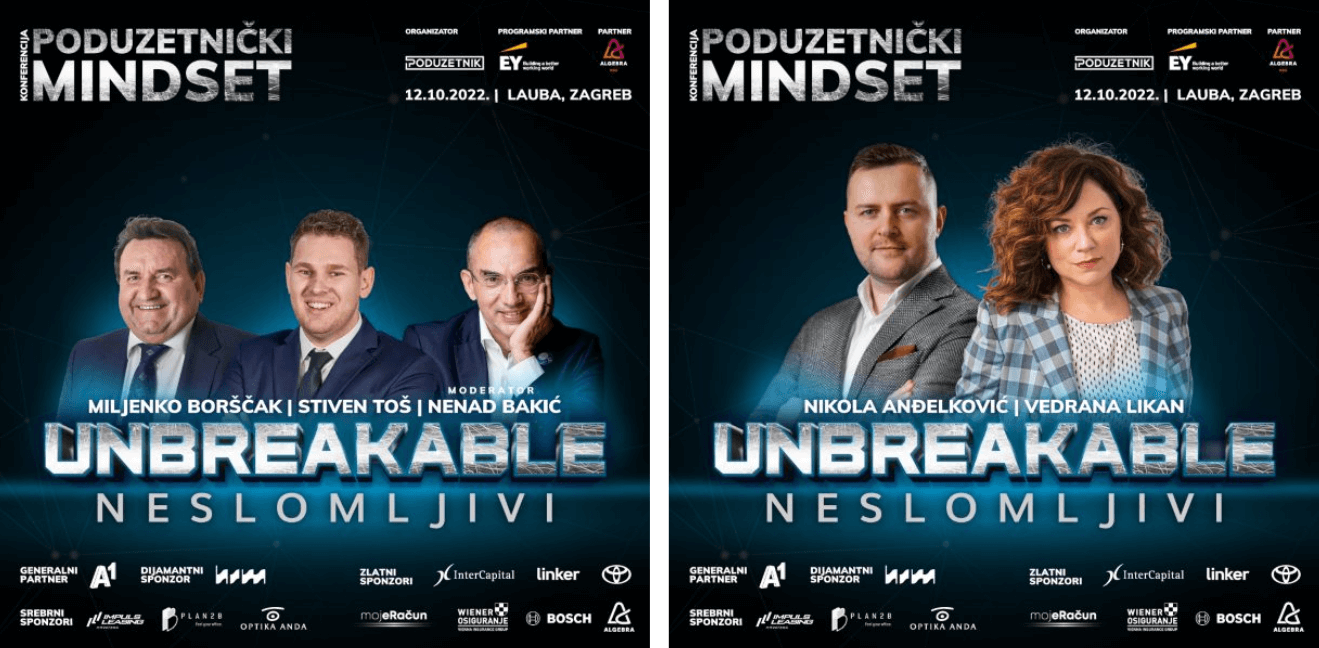
The list of speakers about the strong and unstoppable development in the Croatian ICT sector includes Ph.D. Stjepan Orešković (M+ Group), Nikola Kapraljević (Infinum), Zlatko Hrkać (Sofascore) and Jakov and Juraj Urbanke (HSM).

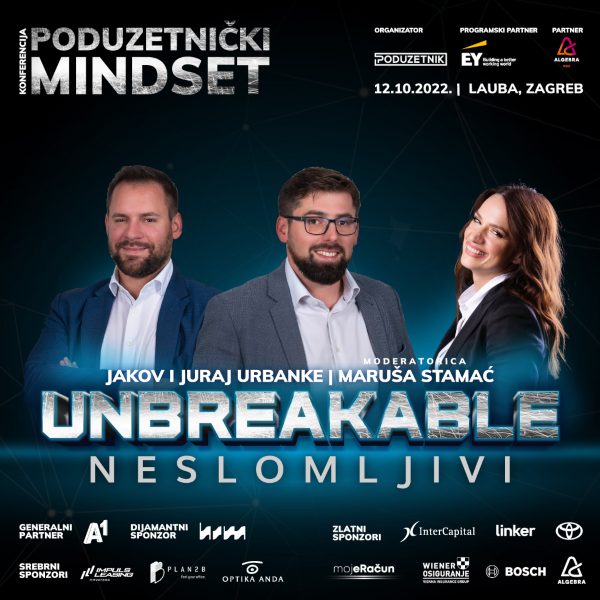
I can, I want, I know - this is the topic of the conversation that Ana Radišić will lead with Dajana Mrčela (Director of Saponia Management) and Maja Šuput Tatarinov, a singer and presenter, who achieved extremely successful marketing cooperation with Saponia and Kandit.
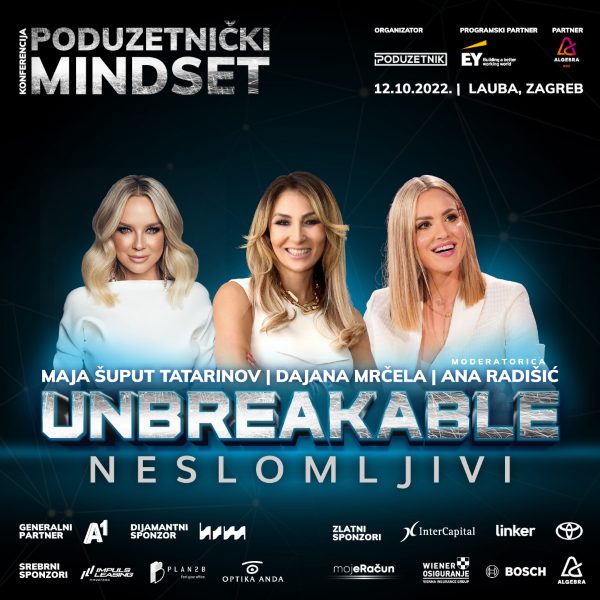
Lada Tedeschi Fiorio (Atlantic Grupa) will look at female leadership, serial entrepreneur Jako Andabak will reveal his entrepreneurial secrets and challenges in a conversation with Božo Skoko, and Davor Tremac (Fonoa) will explore the topic of how to live locally and work globally.
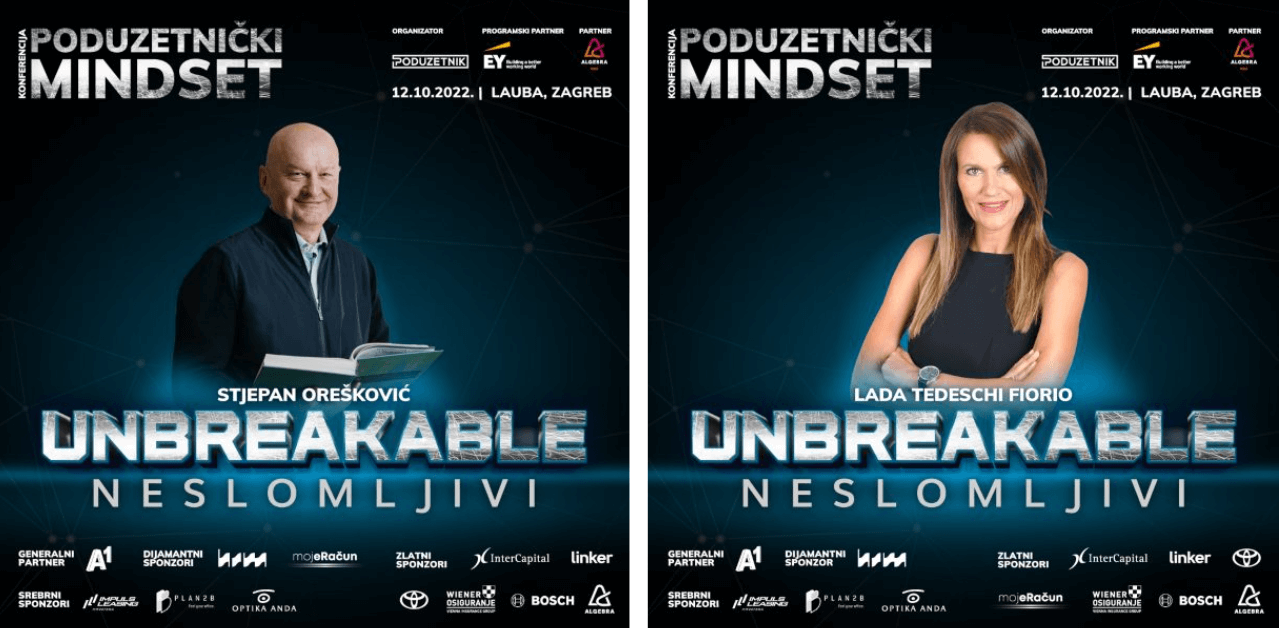
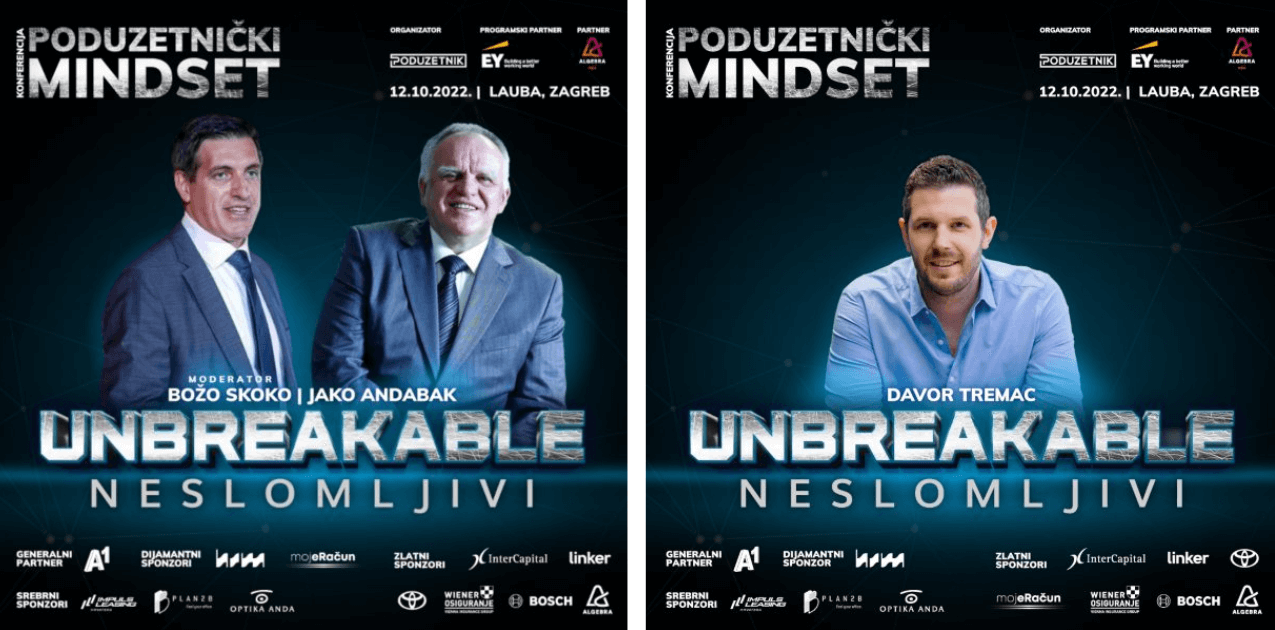
On behalf of the hosts, Ognjen Bagatin (Media platform Poduzetnik) and Berislav Horvat (EY Croatia) will give opening speeches, and Petar Pavić (Star Digital Group) will close the conference.

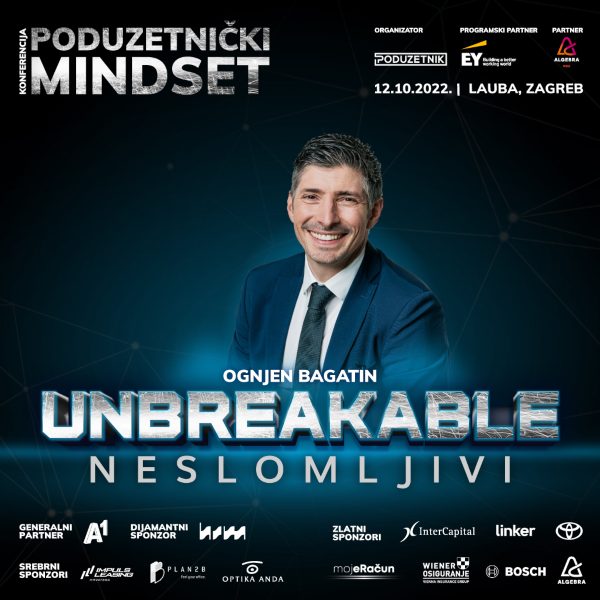
"We believe that the participants of the conference will inspire many with their stories! We are talking about people who did not sit idly by even when things were most difficult for them. They knew that no one would serve them anything on a platter. They got up from the floor after multiple falls. We want Croatian entrepreneurs to inspire the rest of our society. They are innovators, visionaries and leaders! We need exactly such people in the times that are knocking on our door." Ognjen Bagatin, owner of the Poduzetnik media platform.
Get your tickets for the conference Entrepreneurial Mindset: UNBREAKABLE here.
The conference is organized by the media platform Poduzetnik in cooperation with Algebra and program partner EY Croatia.
For more, make sure to check out our dedicated Business section.
Foreign Entrepreneurs Interested in Investing in Varaždin County
ZAGREB, 7 April 2022 - Foreign entrepreneurs are interested in investing in Varaždin County, it was said in Varaždin on Thursday at a meeting of economic advisors accredited to diplomatic missions and representatives of foreign trade offices with county head Anđelko Stričak and mayor Neven Bosilj.
The meeting was organised by the Foreign Ministry's directorate for economic affairs and development cooperation.
Such meetings are an excellent opportunity to show foreign representatives each county's potential and investment possibilities, said Rina Eterović Goreta, head of the directorate.
She said more than 35 economic advisors from more than 25 countries were at today's meeting and that they had shown "big interest" in Varaždin County.
This was the first visit by such a large delegation. Prefect Stričak said the county could offer foreign investors space in business zones and that the its excellence centres were exemplary.
He said there were numerous business zone around the City of Varaždin and that foreign investors were welcome.
Mayor Bosilj said the city had one of the lowest unemployment rates in Croatia, under 2%, and that the economic diplomacy representatives could be shown the potential of the Brezje Zone.
He said there were many letters of intent, the latest coming from Germany. "We also have Swiss and Austrian investors. We want as many quality investors as possible, that they compete with salaries so as to get the best workers."
Representatives of the Austrian ad Hungarian embassies confirmed the usefulness of the information and the potential to develop economic cooperation, saying today's meeting was positive.
For more, check out our business section.
DZS: Croatia Has 168,200 Active Business Entities
ZAGREB, 20 Feb 2022 - There were 307,413 business entities registered in Croatia at the end of December 2021, and 54.7% of them, or 168,242, were active, according to data from the national statistical office (DZS).
The majority of the registered entities were trade companies (230,741), of which 133,928 of 58% were active.
There were 73,113 institutions, bodies and organisations, of which 34,844 were active, while the number of cooperatives stood at 3,539, including 800 active ones.
At the end of December 2021, there were also 88,205 crafts and freelancers in Croatia.
Broken down by activity, the majority of business entities were in wholesale and retail trade, and the repair of motor vehicles and motorcycles, accounting for 17.8% of registered and 16.1% of active entities.
Manufacturing accounted for 7.8% of registered and 9% of active entities, while 10.2% of registered and 12.7% of active entities were in professional, scientific and technical activities.16.3% of registered and 13.2% of active entities were in other service activities.
Most active entities privately owned
Most legal entities were privately owned, a total of 132,582 or 78.8%. The state owned 0.8% of the entities, 0.4% had mixed ownership, 0.5% were owned by cooperatives, and 19.5% of the entities had no information about ownership type available.
Most of the active legal entities, 88,220 or 52.4% had between one and nine employees, while 62,278 or 37% of the entities had no employees. Furthermore, 13,683 entities had between 10 and 49 employees, 3,470 between 50 and 249, 319 between 250 and 499, and 272 entities had 500 or more employees.
Limited liability companies accounted for the largest share of business entities, with 166,209 registered and 98,630 active entities. They are followed by simple limited liability companies, with 61,614 registered and 33,791 active ones.
The largest number of registered business entities were based in the City of Zagreb (32.3%).
For more, check out our business section.
Entrepreneurship in Croatia: The Tide is Turning
February 1, 2022 - The last few were proud years for the Croatian entrepreneurial story. Mate Rimac dominated global headlines for making the world’s fastest electric car (Rimac C Two), partnering with Bugatti, and breaking ground on the €200 million campus in Zagreb. A look at entrepreneurship in Croatia.
While impressive by any standards, when it comes to the entrepreneurial landscape in Croatia, are we potentially missing the forest for the trees?
New entrepreneurial activities in Croatia by region in 2020
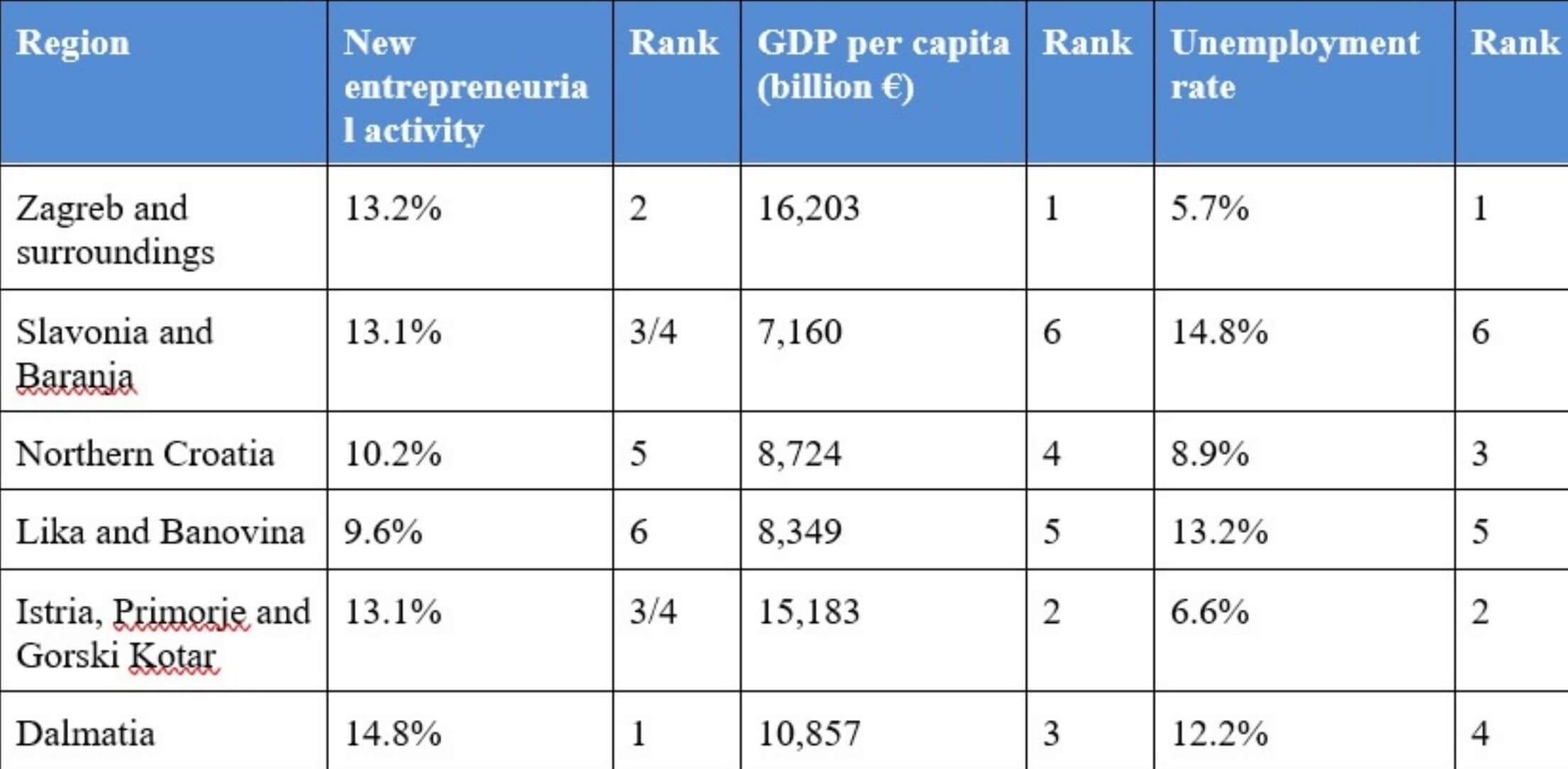
Table adapted from GEM report 2020
Data from the last 6 years of the Global Entrepreneurship Monitor (GEM) show that while the entrepreneurial ecosystem was off to a rocky start, much has been done in the past 2 years.
For more information from the latest GEM report (2019-2020), see TCN’s and here for the full GEM report 2020. GEM is the largest ongoing study of entrepreneurial dynamics in the world, spanning 115 countries.
Ripples from a shaky start
Since Croatia started participating in the GEM in 2000, reports over the years have revealed that the general business environment in Croatia has not been particularly conducive for entrepreneurs.
Out of 44 countries covered by the GEM survey in 2020, Croatia came in at 41. In 2019, Croatia ranked 50 out of 54 countries that participated. Within the European Union, this makes Croatia the country with the most difficult business environment for entrepreneurs.
Countries are ranked according to calculations from the National Entrepreneurship Context Index. A composite quality index that consists of a variety of measures including government policies, barriers to entry, research and innovation transfers, and entrepreneurial education.
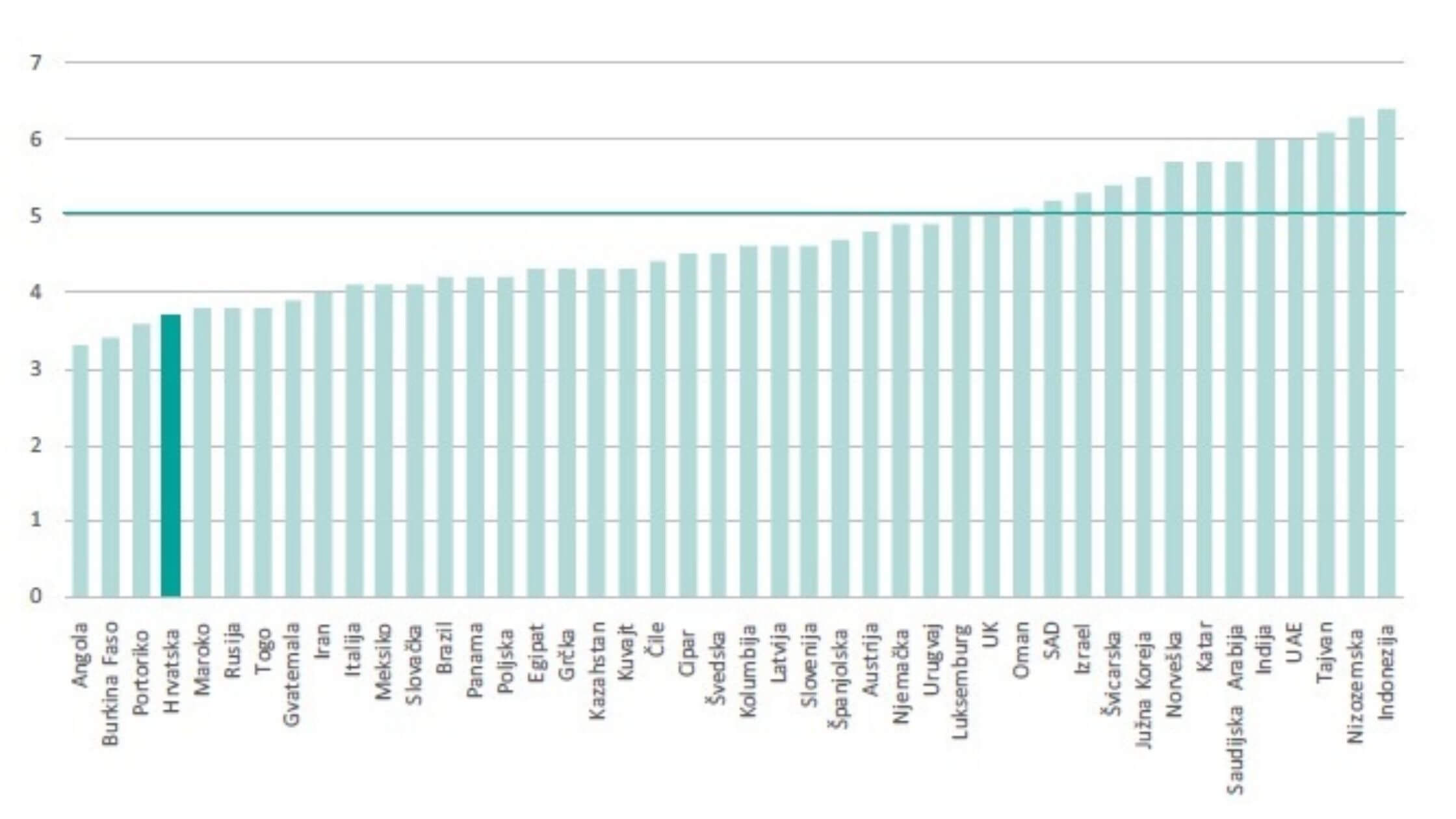 Graph GEM report 2020, (0 - very poor entrepreneurial environment, 10 - excellent entrepreneurial environment)
Graph GEM report 2020, (0 - very poor entrepreneurial environment, 10 - excellent entrepreneurial environment)
Moreover, the majority of individuals in Croatia turn to entrepreneurship as a necessity. These are individuals who have lost their jobs, exhausted all other employment options or are trapped in difficult financial situations.
This is compared to the population of entrepreneurs who are opportunity-driven. Highly disruptive innovators who have identified a gap in the market and created new businesses to serve those needs.
Between 2015-2017, GEM reports Croatia as either topping (2015), or near the top of the list amongst EU countries as having the largest proportion of adults who turned to entrepreneurship out of necessity.
Uplifting trends
By 2020, Croatia showed marked improvements by moving down the list of EU countries to take a middle spot (7 of 14) with less necessity-driven entrepreneurs. There is also a 4% increase in those who choose to become entrepreneurs in order to enact change in the world (35% to 39%), above the EU average of 37.2%.
New entrepreneurial activity (i.e. those who started a business in the last 2 years) also increased from 7.7% in 2015 to 12.7% in 2020, above the EU average at 8.1%.
By comparison, in the United States, 13% of adults are involved in entrepreneurial activity while the average is around 5% in Western European countries such as France, Germany, and Italy.
Moreover, a whopping 75% of the adult population in Croatia felt they were personally capable of starting a business venture, ranking 2nd of all countries that participated in the study. This is compared to only 47.5% that shared similar sentiments in 2015.
Of those who intended to start their own business, almost half of all respondents (47.2%) were confident of doing so in Croatia. This is more than double the number in 2015 (22.3%).
Alongside this growth, the government has also made recent changes to continue this positive trajectory and create a more robust entrepreneurial ecosystem for Croatians.
Steps in the right direction
Spearheaded by the Croatian government and the Ministry of Economy and Sustainable Development, START is an online platform established in December 2019 that enables Croatians to register 2 types of business entities online - d.o.o. (limited liability company), or a j.d.o.o. (simple limited liability company).
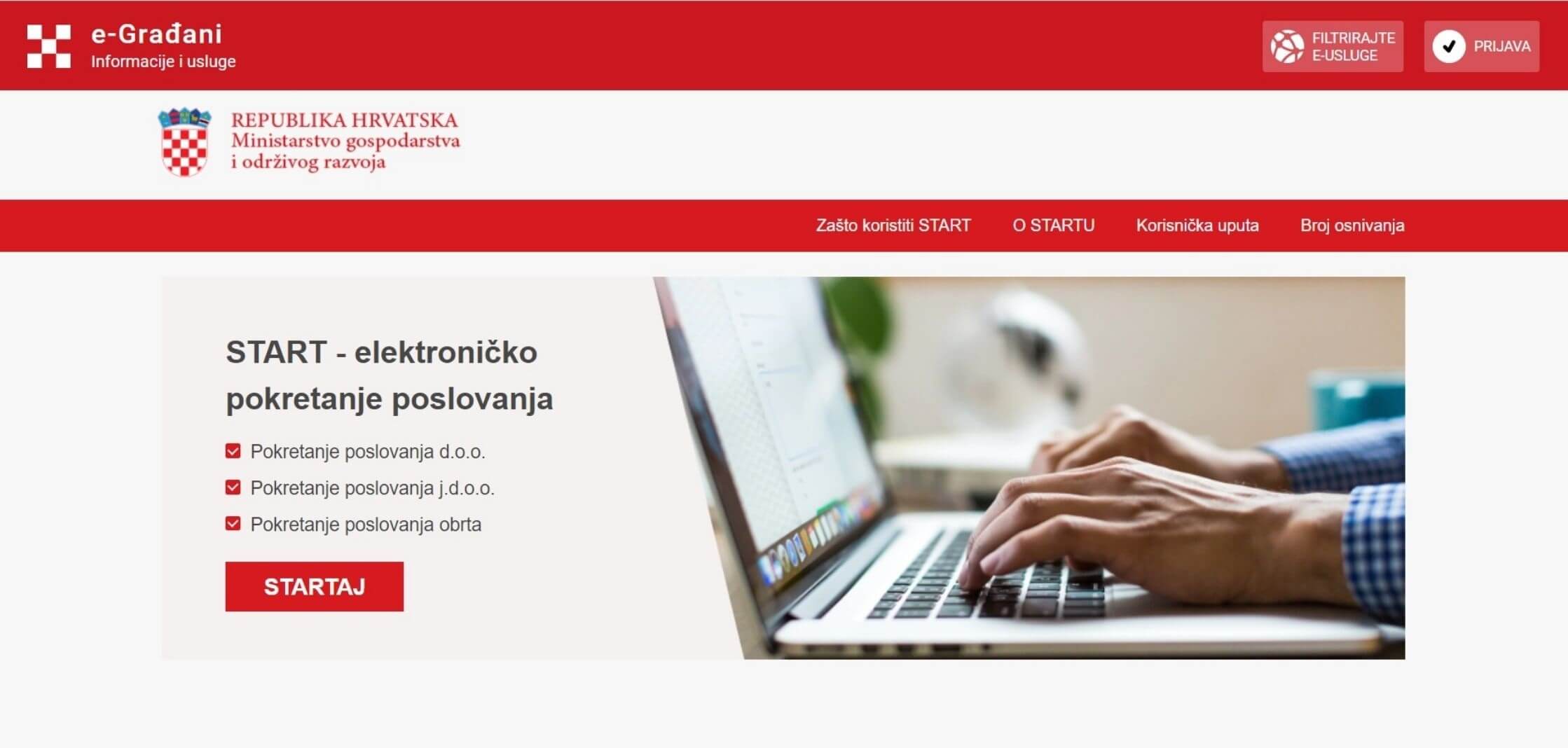 Image: START website
Image: START website
The main goal of START was to address major pain points including the simplification of the administrative process, significantly reduce waiting times and lower costs of starting a business. Court fees to register the business are now 50% lower - HRK 400 to 200 for a d.o.o., and HRK 60 to 30 for a j.d.o.o. Entrepreneurs also no longer bear notarization fees.
It is no surprise that between the launch of START to the end of April 2021, over 1500 new entrepreneurs were able to launch their ventures.
Rapid rise of incubators
The past 2 years have also seen the inauguration of a number of start-up incubators and programs. Prior research confirms that entrepreneurs who participate in these programs establish firms with higher growth rates. Incubators also facilitate access to international markets, R&D programs, and funding, allowing entrepreneurs to become more innovative and produce more advanced technology.
Some examples in Croatia include, the PISMO Business Incubator in Novska, declared the best EU co-financed project in Croatia in 2020. They are also setting up a gaming campus later this year.
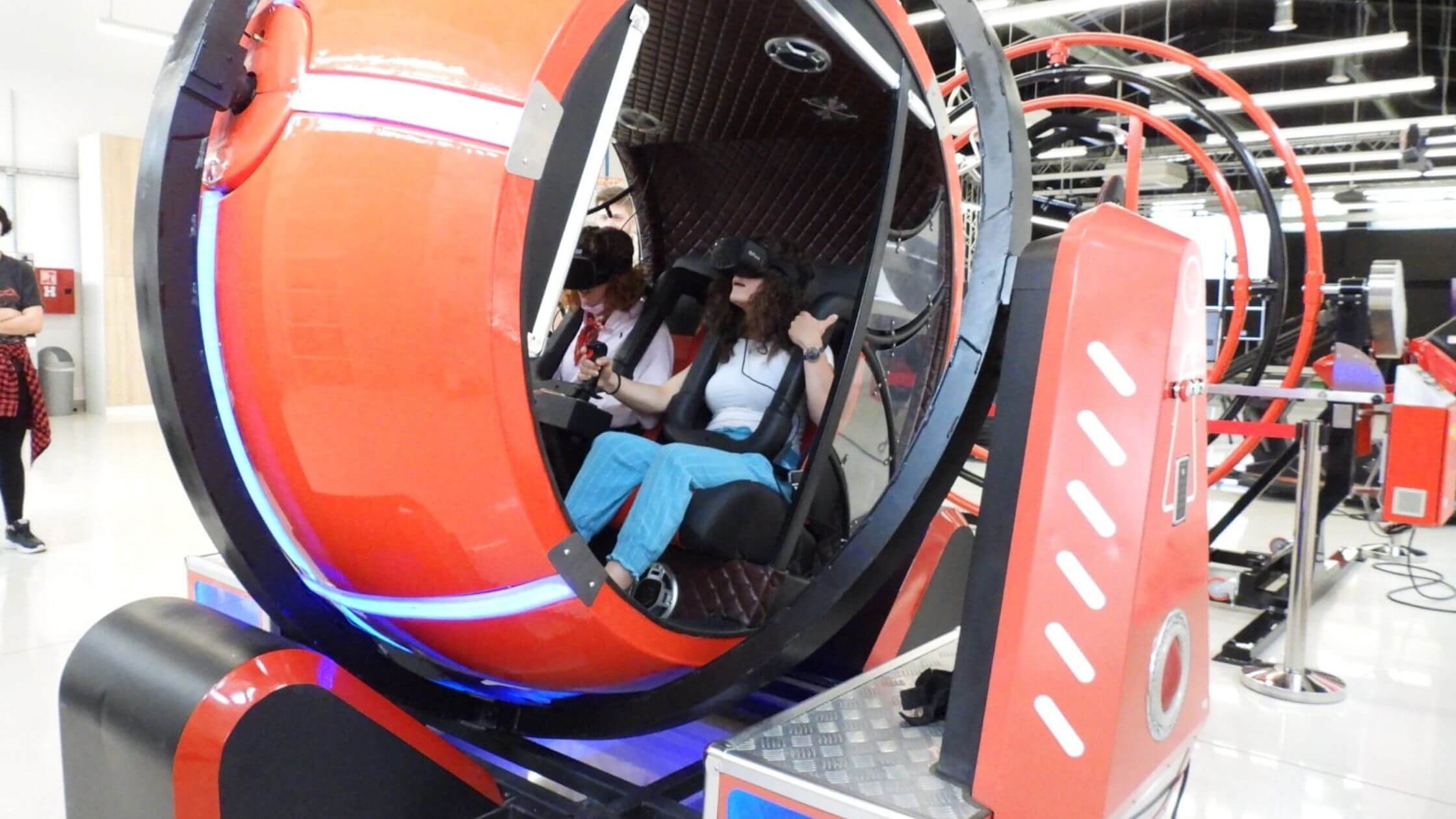
Premises of the PISMO Business Incubator. Image: PISMO Business Incubator/Facebook.
In 2021, the Croatian Digital Student incubator saw 2,000 registered participants from more than 160 schools from all over Croatia. Similarly, the first incubator for female entrepreneurs (Oaza incubator) and BIRD Incubator, the first AI/machine learning incubator also opened their doors.
Croatia’s National Recovery and Resilience Plan
Finally, in September 2021, the EU Council approved the assessment of Croatia’s National Recovery and Resilience Plan. This incentive came with the awarding of €6.3 billion in grants to enact reforms and projects to stimulate economic growth. The government has said part of the grants will go to assisting entrepreneurs in the areas of autonomous vehicles, renewable energy as well as water management.
For more, check out our lifestyle section.
Poduzetni Limaci: Entrepreneurial Project Helping Croatian Kids
January the 9th, 2022 - Poduzetni limaci is an educational initiative aimed at waking up the entrepreneurial and creative spirit in children. This type of education for young school kids in Croatia has been going on since back in October last year, and educated trainers run it.
As Poslovni Dnevnik/Lucija Spiljak writes, the Institute of Management in Zagreb which launched the Poduzetni limaci iniative last year claim that if we teach children from an early age to recognise opportunities with an emphasis placed primarily on social responsibility, solving social problems, improving systems or new approaches and solutions, we will build a society and new generations of entrepreneurs who will primarily strive to improve society.
The aim of the Poduzetni limaci project is to develop the entrepreneurial spirit of kindergarten children and school children from 1st to 4th grade of primary school through various activities, as well as to encourage them to create more responsible, positive changes in society.
The programme has been implemented since October last year in cooperation with the Maksimir Kindergarten and the Silvija Strahimir Kranjcevic Elementary School in the City of Zagreb. The test phase in the two educational institutions will last until March this year, after which they will see what needs to be improved in the programme.
The pilot programme
Following any tweaks, the implementation of the programme would start in other institutions, of which there are currently about ten interested. It represents a total of 35 school hours, and the training is conducted by trained coaches twice a week for 45 minutes for a period lasting for four months. The Poduzetni limaci programme is being implemented in partner institutions in cooperation with teachers and educators as mentors.
"At this moment in time, all those interested can apply. When we complete the pilot programme, evaluate the progress of the children, and accordingly revise it all, we'll offer it for implementation to kindergartens, schools, associations involved in children's education and interested private institutions that want to implement it. For the success of the implementation of the programme, it's extremely important to create a positive environment with the support of various stakeholders from within the system,'' they explained from Institute of Management.
The Poduzetni limaci project was led by the research entitled “Entrepreneurship and Initiative of Primary School Students in the Republic of Croatia: Population Perspective” developed by the Institute for Social Research in Zagreb and the Centre for Educational Research and Development.
The results of a sample of almost 17,000 4th and 8th grade primary school students living in Medjimurje, Varazdin, Krapina-Zagorje, Zagreb County and the City of Zagreb showed that the situation with the "entrepreneurial mindset" among kids in Croatia is extremely low. Only 2.1 percent of the surveyed students have an entrepreneurial profile, while 97.9 percent of them belong to non-entrepreneurial profiles. They also noticed a decline in the propensity for initiative and entrepreneurship in general.
“At the beginning of the programme, the children get better acquainted with the typical characteristics of an entrepreneur and an entrepreneurial type of person, they become aware of the entrepreneurial characteristics within themselves and their friends, and influence the development of entrepreneurial characteristics throughout the programme. They go through the entrepreneurial process experientially, putting themselves in the role of an entrepreneur who, with his team, recognises the problem, finds solutions and creates positive changes.
After the activities organised around the entrepreneurial process take place, the children participate in the creation of their first entrepreneurial initiative. They implement their solutions and realise from designing their own entrepreneurial project that entrepreneurs create new value and that they are really the bearers of positive changes that don't necessarily have to be aimed at meeting personal needs and goals but also social goals,'' they explained from the Institute of Management.
Learning through play
They also learn public speaking skills and come up with presentations for their entrepreneurial projects. After the activities, Poduzetni limaci educators keep a work diary in which they record observations for each child individually and observations from the activities they have carried out. The children also evaluate themselves and their educators, evaluating the commitment, effort and participation, as well as the activities and content of the workshops.
The Institute says that children respond best to activities in which they encounter people and real-life problems.
“For example, a visit to entrepreneur Iva Kumic who makes plush toys from children's drawings or a visit to the Dumovec animal shelter where children could experience and learn a lot about the type of life lived by neglected and abandoned animals, and thus recognise and develop a real sense of empathy. In addition, the children are most happy with those activities in which they learn through play, practical work, group work, some form of physical activity and so on. The most important thing is to focus on the children and their active involvement, and as little frontal work of the educators as possible,'' they poined out.
The Poduzetni limaci project was supported by university professors, as well as by various entrepreneurs with whom the Institute of Management is currently discussing models of cooperation in which they would co-finance the education of these children.
For more, check out our lifestyle section.
Krizevci Students Present Products and Entrepreneurial Ideas
January the 1st, 2022 - Krizevci students have showcased their ability to come up with innovative product ideas and enter into often challenging entrepreneurial waters.
As Poslovni Dnevnik/Ivan Tominac writes, with the cooperation of the Krizevci Secondary School of Economics and the Krizevci Entrepreneurship Centre, young people are also showcasing how they too can become entrepreneurs.
Investing in the applicable knowledge of young people is necessary for their growth, and this is exactly the approach taken when it comes to these talented Krizevci students.
They educate young people there for professions in the field of agriculture, and with the initiative of Professor Gorana Pavicic, the cooperation of the Krizevci Secondary School of Economics and the Krizevci Entrepreneurship Centre (KPC), young professionals are upping their chances of success in entrepreneurship.
Thanks to this initiative, fourth grade Krizevci students managed to combine their theoretical and practical knowledge, as well as improve their competencies and skills in terms of establishing and organising business and designing innovative types of agricultural products and services. The fact that these Krizevci students of this school really have entrepreneurial potential is also shown by their ideas, which are both varied and innovative.
In the second half of the year, they will continue their cooperation within the subject "Independent Management", where third grade students will independently develop business plans for the economy and the subject "The Organisation of Agricultural Production" through which they will learn the importance of different measures, incentives and tenders.
This approach, in addition to awakening entrepreneurial potential in young people, solves the big problem of financial literacy among them, too. In this way, young people gain knowledge about proper financial management, which could be a valuable input for them from the moment when they finish their high school education and get acquainted with the demanding labour market.
"If you don't have financial resources and some form of financial background, you don't have the opportunity to realise your business ideas and projects. As part of one of the courses, Krizevci students researched how to finance their business ideas, studied which banks offer which financing opportunities, whether there is any financial support or any measures that would be in line with their chosen economic activities, and there were also ideas floated about financial partnerships,'' Pavicic pointed out.
"This plan and programme exists and it should definitely be adhered to, but it's up to us professors to choose the way in which we'll implement that plan and programme. We want to bring knowledge as close as possible to the students themselves, and I think that the best way to do that is with practical classes, practical exercises and tasks, which is actually a characteristic of our school. Since we have a farming, gardening, fruit growing, cattle breeding, dairy and mechanical practicum in the school, we try to connect theory and practice as much as possible. The great thing in all this is the support of the director Toni Svoboda,'' said Pavicic.
"Expectations at the end of the high school year are certainly the ability and independence of students to start their own businesses, and judging by their dedicated, I believe that when it comes to these Krizevci students, if they decide to take on an entrepreneurial venture one day, they will certainly succeed,'' she concluded.
For more, check out our lifestyle section.
CircuitMess Batmobile: Croatian Company Collab With Warner Bros
October 5, 2021 - CircuitMess Batmobile is the new DIY product made by a Croatian company which has made a name for itself by making products that promote STEM technology.
From ''do it yourself'' (DIY) videogame consoles, to DIY mobile phones, DIY DJ sets and much more, the Croatian company CircuitMess has well and truly made name for itself internationally.
Led by 22-year old entrepreneur Albert Gajšak, this company creates products which don't just provide fun, but also education about electronics and programming with hopes to popularise the STEM area (science, technology, engineering, and mathematics) for younger generations. With the need on the market growing ever larger, but with the lack of interest for the field, CircuitMess want to both entertain and direct kids to STEM and show that it isn't dull, nor does it have to be tough.
As with previous products which were supported by Kickstarter, a web platform where people can propose their ideas and get financial support their projects (through crowdfunding campaigns), and this is the case with their next big product: The Circuitmess Batmobile.
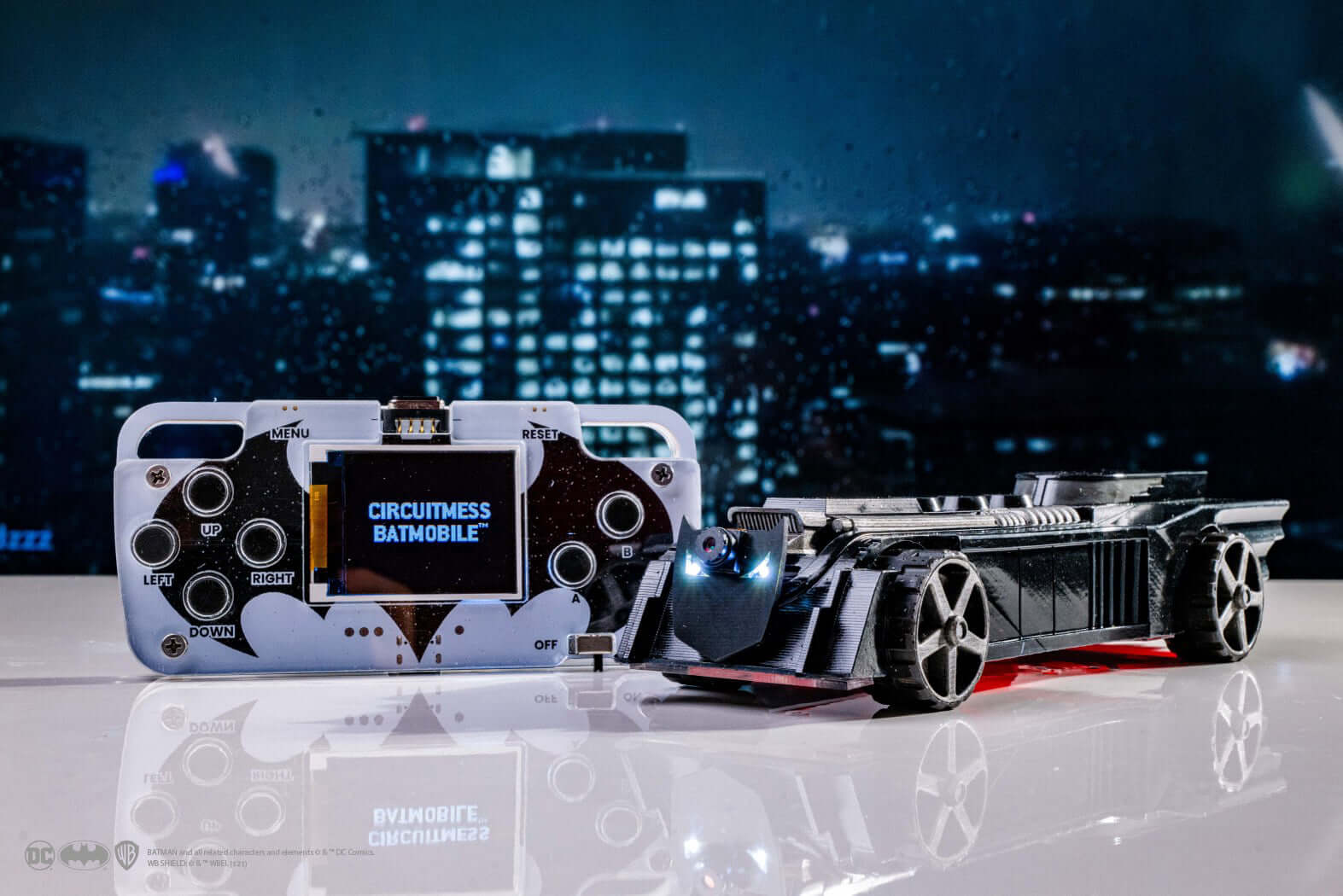 © CircuitMess
© CircuitMess
This new edition, a small robotic car that drives around autonomously using AI and machine learning was presented by Gajšak himself at a press conference at CircuitMess on October 5, just as the kickstarter campaign was officialy launched. The campaign will last until December 4, and at the time of writing this article, the very same day it started, the campaign had received am amazing 70,178 US dollars. This result with 476 backers in just a few hours is even more fantastic when you see that the initial goal was a mere 15,000 dollars. With 59 more days of the campaign still to go, things seem to be going in the right direction.
''The Circuitmess Batmobile has one camera, and a processor that will allow for machine learning so it can memorise visual cards or a ball (part of the package) and much more. Batman is a superhero who has no superpowers, instead, he has technology with which he saves Gotham. This is line with what we try to promote and show children. You can be like Batman, if you use your hands and learn,'' explained Gajšak at the press conference.
The work on the CircuitMess Batmobile lasted for around two years, and the project was pitched to and approved by none other than the globally famous and respected Warner Bros company. When asked about the design (black with a distinctive bat-head on the front), Gajšak mysteriously said they had various ideas for the design which will be recognised by Batman fans. A little later, he confirmed for TCN that their inspirations included the 1992 animated series and a ''Batman Rebirth'' comicbook from 2016.
''By landing this cooperation with Warner Bros, we hope to show that CircuitMess is no longer a small company,'' said Gajšak The company indeed grew with around 50 partners that distribute CircuitMess products worldwide either through webshops or in physical stores. Over 52,000 of their products have so far been sold globally, mostly in the USA, UK, New Zealand, Singapore and Australia.
Whether the Batmobile will be the coolest product made by CircuitMess is yet to be seen (although the kickstarter results look promising), but it's definitely the easiest product for the user to assemble so far. Suitable for kids over six years of age, this product has magnetic connectors and requires no soldering.
''People sometimes get scared when they need to solder our products because they worry that it could be dangerous or just for professionals. So, here we have magnetic connectors. We'll see how they will do and perhaps open up some room for more creativity in the future. So far, when a CircuitMess Product, for example, gives you instructions to build a game console, you have to end up building a game console. But when I was a kid and I played with Lego, I followed the instructions to some point, then I ended up building something completely different. With magnetic connectors, there's a chance for that, too,'' explained Gajšak.
However, the success of the Circuitmess Batmobile will determine whether or not magnetic connectors will be used in next products made by the company.
Even though the easiest DIY product (estimated to take 60 minutes to be built and then you're onto programming and playing), Gajšak pointed out it will not be boring for those who want more. An additional ''Inventor pack'' has more components and even more possibiliters are presented in the ''Ultimate pack'' for the pros.
Along with the excitment of presenting the CircuitMess Batmobile, Gajšak also used the press conference to point out the problem of crowdfunding in Croatia.
''We're using a mediator in the US for our kickstarter campaigns becuase we have no access to kickstarter in Croatia. Croatia is part of the EU so there's no reason for it to be that way,'' complained Gajšak, hoping to see change and the allowance for both CircuitMess and other entrepreneurs in the country to propose and get support for their projects with more ease.
Learn more about Croatian inventions and discoveries from Tesla to Rimac on our dedicated TC page.
For more about STEM technology in Croatia, follow TCN's dedicated page
Davor Nađi Interview: "Fokus Party Not for American-style Economy, Dutch or Scandinavian Preferred"
July 16, 2021 - One month after the local elections in Croatia, the liberal/center Fokus party president shares with TCN reflections of his Zagreb mayor candidacy, details on political views, plans, and hope for the future of Croatia. Learn more about the Fokus party in an exclusive Davor Nađi interview conducted by TCN reporter Ivor Kruljac.
2021 local elections for Croatia concluded back in June, and as with every local election, the majority of political parties whose candidates earned some new positions in the local governments managed to taste both victories and losses are overall happy. Some parties from both left and right political wings celebrated as scientists whose work won the Nobel prize. Even election losses were interpreted as victories, drawing attention to the number of votes, that although they may not score political roles, show growing support. If there is a once in four years occasion when political parties have as much optimism as the Croatian Adriatic has drops of water, it’s the local elections.
Currently in parliamentary opposition, Davor Nađi, president of the Fokus political party, politically declared as center-oriented, also doesn't hide his optimism following the result, but it seems he is a bit more toned down in that excitement than some of his political competitors. Satisfied to see his colleagues from the party keeping their previous positions, and some even selected for new ones, he is expecting the Fokus party to grow in the future while remaining aware of Fokus being new and young on the scene - is careful to say more than he can bargain for. Nađi ran for Zagreb mayor, but in the end, didn't manage to win neither the "main prize" nor a seat in the Zagreb Assembly. He noted, however, that his candidacy helped to attract new Fokus members in Zagreb, but again stating it without grandiose announcements, rather with mild optimism, careful not to step out of the line of realism.
In an e-mail interview, Nađi commented what happened in the Zagreb elections, did NGOs stepped out of line in supporting current mayor Tomislav Tomašević, and what do Fokus voters find attractive in the political party best known for reforming the town of Sveta Nedelja. Are they American-styles libertarians as described by some, and what European politicians are in line with Fokus’s ideas, are just some of the things Nađi revealed in the interview.
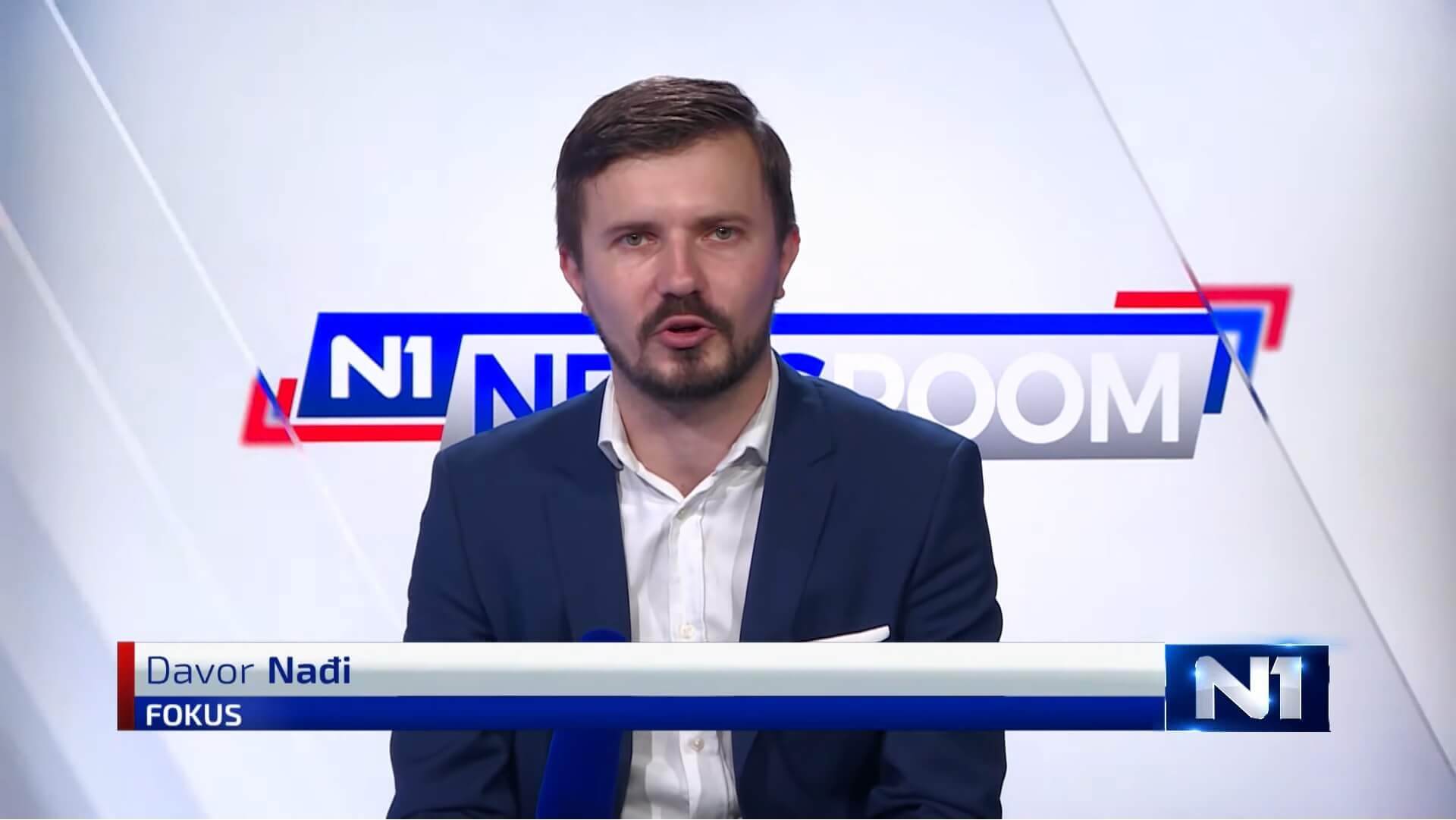
screenshot / N1
You are the president of the Fokus party, and candidates from your party had won in Sv. Nedelja, Samobor, Sv. Ivan Zelina and Dugo Selo. So, your party currently has four mayors. Can you list for our readers where your party had candidates for mayors, assemblies, and counties? How do you comment on „your mayor's" first-month post-election, and what moves would you point out as excellent in that time?
Except for these four cities, we also won in the municipalities of Križ and Pirovac. We ran for mayors and local and regional assemblies mostly in central Croatia (Zagreb and Zagreb county) but also in Čakovec, Slatina, Petrinja, Pirovac. We won 50 members of local and regional assemblies, including the president of assembly in Čakovec.
Most of our mayors were reelected, so they just continued working on projects. However, I would like to point out our new mayor of the city of Samobor, Petra Škrobot, who already contracted procurement of software for transparency of city budget and public procurement, which is one of the flagship policies of the Fokus party.
How would you briefly explain to our readers what your party represents and advocates politically? What politicians, foreign or Croatians are your role models, and why?
We represent the fight for lower taxes and fewer regulations for citizens and the private sector and for a more efficient public sector. That means that we want that people and companies can keep more of the money they earn for themselves and decide on what they want to spend it. For example, that is the only correct way to solve the housing problem – to make sure that people earn and keep more money. Further on, that means that the private sector gets better value for money through better service of the public sector where, in our vision, worst or/and unnecessary public servants would be let go, and the best workers would get a financial reward. We also talk and act on investments in infrastructure, which is important for preparing for future climate change challenges.
I can’t say I have some role models in politics, but I like the politics of Dutch PM regarding the economy because they have a small and efficient public sector that provides good service to their citizens. That allows them to keep their economy very competitive, which results in a better life for their people.
You express deep care for private investments, lowering taxes, and overall creating a better environment for private business and entrepreneurship. But, when talking about entrepreneurs in Croatia, people roll their eyes as many of our famous „entrepreneurs“ are associated with crime, corruption ties to politics, and unfair privatization that ended up in many people losing their job. What is your opinion on these entrepreneurs, such as Todorić or Horvatinčić? How to fix that negative perception of entrepreneurs?
Yes, the private sector is very important to us. We care about entrepreneurs but also about their employees. We also care about the best public servants too.
I think that public opinion on entrepreneurs is changing in a good way because of a new generation of successful entrepreneurs that succeeded in the global market with no connections to the government. Todorić and Horvatinčić are the exact opposite of them and represent everything that is wrong with this country. It’s wrong to call them entrepreneurs because they are a product of crony capitalism. The only cure to fight people like them is an independent and efficient judiciary.
New option for liberals in Croatia
You ran for mayor in Zagreb. The polls didn't give you too much of a chance, but libertarian (classical liberal) oriented site Liberal.hr said that you could be „the biggest surprise of the Zagreb elections“. To tell you the truth, it didn't seem likely you will become a mayor, but I was very surprised you didn't win a seat in the assembly. What went wrong in Zagreb, and how is it possible that the city with the most developed business climate and entrepreneurship (and with a lot of entrepreneurs) didn't reward your entrepreneurship-oriented ideas, at least with the seat in the assembly?
Well, Fokus is a new party, and I’m relatively new in politics, so a lot of people weren’t informed about our program and achievements. Fokus party didn’t exist in Zagreb until this year, while other parties were building their organization for many years, so it was hard to catch up in just a few months period during a partial lockdown. However, even though we didn’t win a seat in the assembly, we achieved some other goals. Now we have a lot of new members, and a strong organization in Zagreb and a lot of people have heard about FOKUS for the first time. Further on, we are the strongest liberal party in Zagreb, and we had better results than a lot of old traditional parties. So I believe that in the future, our support will only grow in Zagreb.
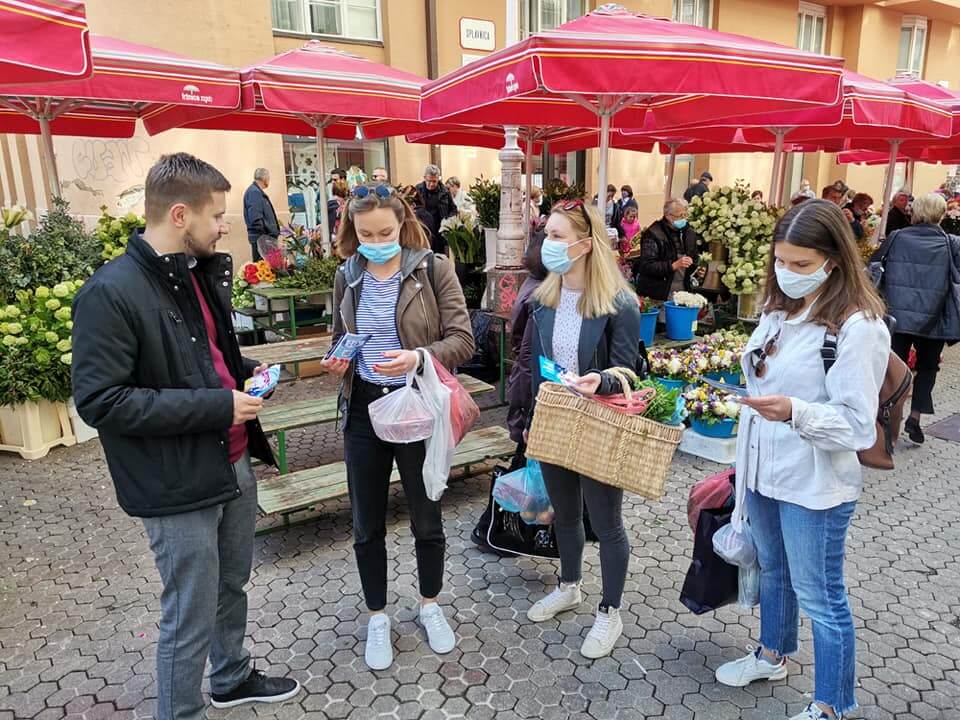
Davor Nađi during his campaign in Zagreb © Davor Nađi
You said on your Facebook site that you didn't receive enough media attention, and indeed you weren't invited to the debates (with the explanation being that only those who earned 5% in polls will be invited). However, you had banners and posters across Zagreb where you talked about how you are experienced to be a mayor because of Sveta Nedelja, where you were a deputy mayor, and the town did receive media attention few years back for amazing changes introduced there. What was your contribution to the transparency of public servants, lowering taxes, and canceling the subtax in Sveta Nedelja as deputy mayor?
I was the designer of those policies with the strong support of mayor Zurovec and the city council, and I was working on these policies from the beginning until the implementation. I’m very proud of that because Sveta Nedelja did the biggest tax cut in Croatia, became the most transparent city in Croatia, and received a reward for the best local economy three years in a row.
You criticized some of the moves by the new Zagreb mayor Tomislav Tomašević. Can you repeat what do you find problematic in his governance so far, but also, is there anything positive, something you would support him in if you made it to the Zagreb assembly?
There are some things that are good, and some are not. I reacted on one occasion, but let's wait a little bit more time before I can comment general impression so far.
However, for our readers who are foreign and didn't have the chance to see your comment in Croatian, can you briefly explain what did you found problematic with Tomašević early on to the point that you had to react publicly?
He stopped most of the public procurement. Even though I understand his concern that there might be corruption problems, that is not the way to solve that problem. That problem should be solved with better process and clear guidance from the mayor to the city administration because if public procurement is stopped for too long, there will be problems for citizens. On the other hand, in a short period of time new mayor will not be able to change much if he doesn’t make the process of public procurement more transparent and efficient.
Far from the US philosophy
Once on N1, you said political parties in Croatia are still pretty socialistic. Since on that occasion you were a guest at N1 regarding Zagreb Reconstruction Bill, did you mean they were socialistic just in that regard or in general? Are Croatians also socialistic too?
They are socialistic in general, and that bill was just the latest example. That orientation of political parties in Croatia resulted in a situation in which an enormous part of the economy depends on the state so we actually have crony capitalism. That sends the wrong message to the people, so people lose self-confidence and think they can’t earn for themselves and their families, and instead, they rely on the state to help them in every aspect of their life. They simply don’t take into account the fact that the state is corrupt and inefficient, which may be because of inadequate financial literacy.
However, it seems to me that the tide is changing with the lead from the local level from cites like Sveta Nedelja and that people are beginning to see the benefits of liberal policies.
When you say the parties are socialistic, some could think this is the heritage of Yugoslavia. However, aside from the communist experiences of South-Eastern Europe, the overall European political culture and tradition goes along the way „yes to democracy, yes to free market, yes to the individual freedoms“ but also „yes to social care, yes to free health, yes to free education, yes to supporting cultural and artistic projects, scientific research, etc“. Many people see Fokus as being against that and wanting to dismantle that European political culture with American political culture, which seems to be notorious in Europe for its health and education system, which as people see it, „is alright if you have cash, but not for the poor“. Are you indeed into „making Croatia American rather than European?“ and if so, how would you address the mentioned sectors of health, education, culture, and science? What about HRT in that context (as the idea of a public TV financed by the state is a European invention in the media landscape)?
Of course, we are not for an American-style economy. We prefer the Dutch or Scandinavian style with high economic freedom and adequate social benefits. Some people don’t understand that “free” health care doesn’t exist. Taxpayers pay for that. And if we think a little bit more about our health care system, do we really have health care that is accessible to the poor? How long are the waiting lists? People pay taxes for health care, and when they need it, then they don’t get it. That is not free health care! Almost the same is for everything else. I believe that vouchers would solve that problem because then even poor people could afford health care service from the private sector, and the public health care system would have to be more efficient and provide better value for money. The same thing is possible with education. HRT should be significantly downsized, and subscriptions decreased with the option to opt-out from their service.
When it comes to the overall Croatian political landscape, Fokus does offer something truly different from other political options, and it seems quite right to expect that Fokus will continue to grow. But, what do you think made Fokus uprise to start in central Croatia, in Sveta Nedelja, Samobor, Dugo Selo, and Sv. Ivan Zelina? Is there something that makes the culture and society in these areas different comparing to the rest of Croatia that they were the first to recognize and give a chance to your program?
Fokus also has a mayor of Pirovac in Dalmatia and president of the city council in Čakovec, members of City council in Slatina, etc, so I wouldn’t say that our policies are only recognized in central Croatia. However, we have better support in parts of Croatia, where fewer people work in the public sector and more in the private sector. That is not surprising since we promote policies that would result in a more efficient public sector and less red tape and taxation for the private sector.
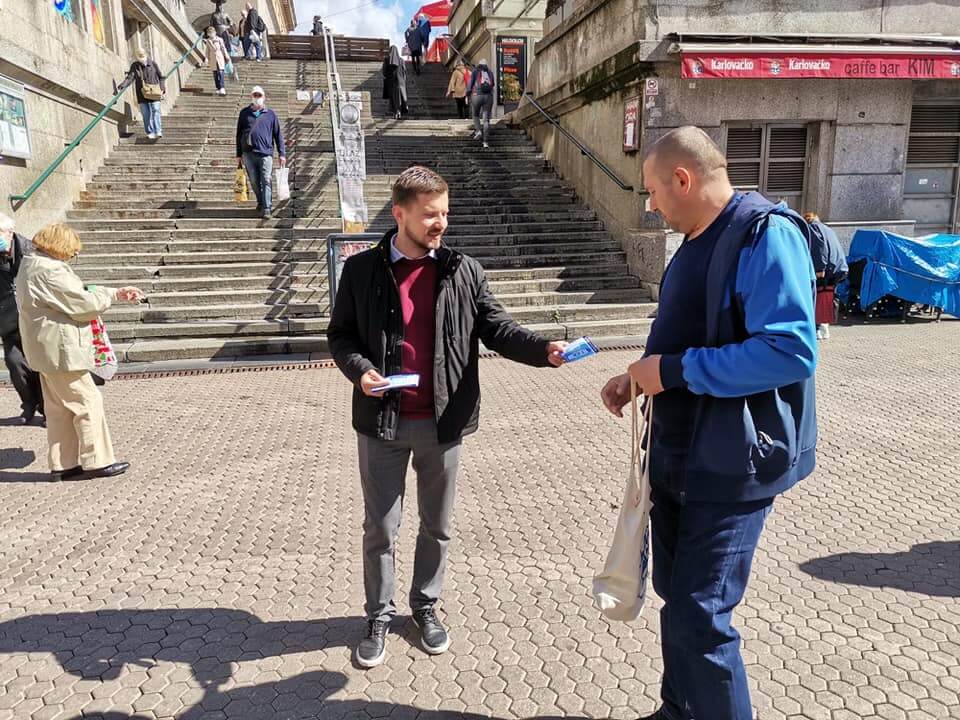 © Davor Nađi
© Davor Nađi
Up next: European elections and Croatian Parliament
On the note of local success, many view local elections as a forecast for what can happen in parliamentary elections. How would you rate your chances on the next parliament elections based on local results?
I’m very optimistic. Fokus has a very good position to grow and to achieve a great result. Fokus is already a success story and we have grown in a number of members in every part of Croatia. I believe that a new government after elections will not be formed without a strong party or coalition from the political center, and if we look at the results of local elections, Fokus is the fourth party by a number of mayors in Croatia. Also, we are the strongest party of the political center in national ratings, so that gives us reason to believe that we can gain even more support from our citizens in the future.
Back to the Zagreb elections. The two main candidates represented Gree-left values and national, conservative, sovereign values. Tomašević not only got support from some of the other European mayors but, just as with Škoro's values, there are plenty of same-minded people in Europe sharing those values. You mentioned your appreciation for the Dutch Prime Minister, but are you as well in contact with like-minded parties and politicians in the EU?
Fokus is a new party, so we still haven’t formed significant international alliances, but we can see ourselves working with other European liberal parties. Of course, the one with the best results is Dutch VVD that is in power on the state level.
But when we talk about the support that Tomašević or some right-wing parties and NGOs in Croatia had in recent years from abroad; I would say that there is a thin line between support and meddling into elections, and I would say that that line was crossed.
But, can we expect that Fokus will try to be in communication with them? Any plans for running on European Parliament elections as a good point to meet with other think-alike politicians in the EU?
I said that we don't have some significant alliances with them. However, we are in contact with some of them. We will see where that will take us. EP elections could be the first opportunity to test eventual cooperation.
And regarding what you said about there being a thin line between support and meddling in elections and how that line was crossed in Zagreb elections by NGOs, is there a risk of entrepreneurs doing the same thing when supporting, either financially or with public influence, certain parties? How can we prevent such meddling legally but yet with respect to the right of political expression to organizations and individuals?
I don’t see the financial support of Croatian entrepreneurs to political parties as a problem. The problem is only if they receive privileged treatment after the election in return for giving financial support. I would go one step further and say that we should welcome donations of private individuals and companies to political parties because that would mean that political parties would be less dependant on public financing. That should be a normal part of the domestic election process. However, if foreign money is included in financing political parties or their leaders, direct or through other channels, then we as a state have a problem.
To conclude, you are MA of the economy, and you talk a lot about economic solutions. Are our economy and business truly the core issues politicians need to address? Additionally, what are your views and the views of Fokus on defense policy, diplomacy, international relations, emigration policy (asylum seekers trying to enter Croatia), Croatian veterans, diaspora, and the ideological, historical disputes among Croatians, which for better or worse seem to often resolve the elections on a parliamentary level?
It would take a much longer conversation to answer all these questions, but I will try to answer in few sentences. Yes, I believe that economy is the most important issue that needs to be addressed because that is the place where value is created and which provides a better life for people and necessary funding for all government programs. Without a strong economy, the state can’t finance defense or social benefits. Unfortunately, you are right that elections are, in the biggest part, decided on other issues that target emotions rather than reason.
When it comes to defense policies, liberals believe that the basic tasks of the state are to provide to their citizen's rule of law and protection from foreign and domestic threats. So we should have adequate defense capabilities. On the other hand, we have no problem financing social benefits to real war veterans, however almost 30 years after the war, there shouldn’t be any new users of these benefits. Regarding international relations, our position is that Croatia should remain an EU and NATO member with strong relationships with the USA and with a clear position that China can’t be our partner until they don’t behave by the same rules like everyone else with the biggest concern regarding human rights issues.
Even though we are a small country, that doesn’t mean we can’t lead by example. It is up to us if we will stay on the bottom of every European statistic table or we will start going up. We have all the resources we need to thrive.
Learn more about Croatian politics and history since 1990 on our TC page.
For more about politics in Croatia, follow TCN's dedicated page.
Entrepreneurs To Have One Chance For Debt Forgiveness, Reports Večernji List
ZAGREB, 2 June, 2021 - Every entrepreneur should have one opportunity to have their debt forgiven during their entrepreneurial life and to be able to do business without hindrance, Večernji List daily said on Wednesday.
This is provided for by the Directive on preventive restructuring frameworks and second chance from 2019, which EU member states have to introduce into their legislation by mid-2021, that is in a month.
The Croatian Ministry of Justice has also announced that it will initiate amendments to the Bankruptcy Act and the Consumer Bankruptcy Act to adapt them to the Directive, but a bill of amendments has not been presented yet so it remains unclear whether Croatia will additionally regulate discharge of business debts.
In Croatia, there are currently about 16,000 entrepreneurs with blocked accounts, and about 8,000 of them are companies, while the second half are craftsmen and other entrepreneurs who keep business books. The total debt of all entrepreneurs amounts to about HRK 6 billion.
The situation is much more difficult for nearly 240,000 citizens with blocked accounts, whose debt principal totals about HRK 17 billion.
So far, the state has twice written off debts of citizens with blocked accounts as part of special campaigns, but that has not significantly affected the overall situation.
Debt write-offs for entrepreneurs were the most common in pre-bankruptcy settlements established by former finance minister Slavko Linić during Zoran Milanović's term as prime minister. Later, the law changed and debt write-offs are now less frequent.
The EU Directive does not address citizens' debts directly, but it proposes that states apply the principle for debt forgiveness for entrepreneurs to over-indebted citizens.
Under the Directive, everyone should have the opportunity to have their debt written off in a procedure that should last no longer than three years, Večernji List said.
For more about business in Croatia, follow TCN's dedicated page.


